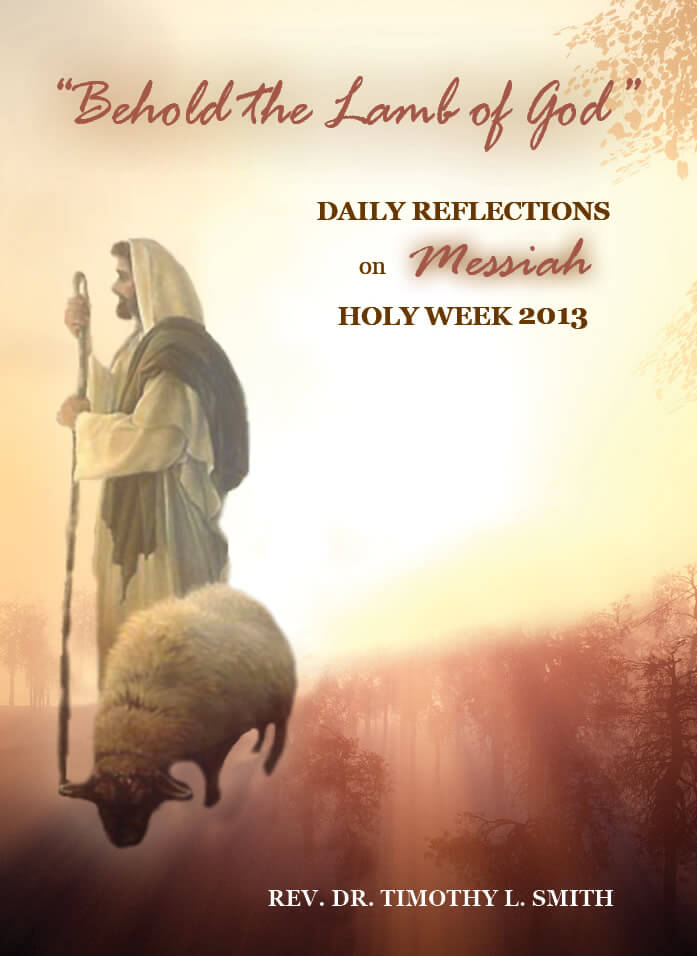As you read and reflect on today’s Holy Week devotional, please listen to this track from “Messiah”.
“All we like sheep have gone astray; we have turned everyone to his own way. And the Lord hath laid on Him the iniquity of us all.”
Isaiah 53:6
TEXT

As a boy I was always struck by how sheep could find that one hole in the fence to get out, but could never find it to get back in. They would wander off from the safety of the pen and become easy prey for any predator. They lacked any sense of danger and would never come back looking for home.
Phillip Keller was raised caring for sheep in East Africa and later had sheep ranches in British Columbia. In his modern classic, A Shepherd Looks at Psalm 23, Keller describes his experience with the waywardness of sheep:
Being stubborn creatures sheep often get into the most ridiculous and preposterous situations. I have often seen my own sheep, greedy for one more mouthful of grass climb down steep cliffs where they slipped and fell into the sea…Another common occurrence was to find sheep stuck fast in labyrinths of wild roses and brambles where they had pushed in to find a few stray mouthfuls of green grass.
In Bible times sheep were totally dependent upon their shepherd for protection, food, watering, shelter, and caring for injuries. They would not survive long in the open field without a shepherd. It is thus significant that the Bible most often compares people to sheep. God loves and cares for us as the sheep of His pasture (Psalm 100:3), but knows how prone we are to straying and wandering from Him.
Lest anyone think he or she has not strayed or turned away from God, the Word of God says otherwise: “all we like sheep have gone astray”. Then God’s Word individualizes the universal problem by adding that“each of us” has turned his or her own particular way from the Shepherd. We have willfully chosen a way we think of as better than His. But here is the surprise: “the Lord hath laid on him the iniquity of us all”. How amazing the grace that each of us is guilty of sin, but the punishment falls on Messiah! We are the lost sheep for whom the Good Shepherd lays down His life (John 10:11).
You will never see a lost sheep in search of the shepherd; the Good Shepherd comes looking for us. The Bible is not the story of humanity’s quest for God, but the story of God’s quest for us. A righteous and holy God had to deal with sin, and He dealt with it by laying it on His own Son. We can do nothing to save ourselves; we can only accept God’s acceptance of us. “But God commendeth his love toward us, in that, while we were yet sinners, Christ died for us” (Romans 5:8).
Today’s Scripture text can be read as our own personal confession: “all we like sheep have gone astray”. May it also be our own personal confession of faith: “the Lord hath laid on Him the iniquity of us all”. Let our hearts rejoice and rest in the good news of Messiah: “For ye were as sheep going astray; but are now returned unto the Shepherd and Bishop of your souls” (I Peter 2:25). Welcome home!
MUSIC
The music opens in a way that may at first be confusing. The notes might sound out of place and inappropriate, if not irreverent. Up to this point the music has been appropriately serious about the suffering of God’s Lamb and how He bears the sins of the world. But now the music erupts with the sound of silly, thoughtless sheep cavorting on the hillsides reveling in their shame of going astray.
Then we realize again the genius of Handel as both an interpreter of Scripture and a composer of music. He is painting in musical notes the sound of people intentionally going away from God. Here is the deliberate waywardness of sheep for whom the Shepherd lays down His life.
Like lost sheep the music line wanders about, mindlessly and hopelessly stumbling over embellished notes, turning this way and that, running into other melodies. And in this there is not a suggestion of sorrow or regret for having gone astray. Such is the stupidity of sin and straying.
But in the second half of the movement the music converts to an adagio, a slower tempo, as the sheep run into reality. They face the gravity of their sin and how “the Lord hath laid on Him the reality of us all”. In a series of ever descending half notes we hear the burdensome weight of our sin laid upon Messiah. Sin on top of sin is laid on Him. Calvin Stapert observes how the voices hold the note when they come to “Him”. The basses hold the note for “Him” fourteen beats.
“Then again they sing ‘hath laid on Him, hath laid on Him’ pausing together on ‘Him’. Finally they complete the sentence, slowly and all together, and with an excruciating dissonance at the end of ‘us’.” (Stapert)
PRAYING MESSIAH
- What do you sense that God might be saying to you in today’s Scripture text and music from Messiah?
- What do you want to say to God?
- Now take a few moments to be still in God’s presence.



